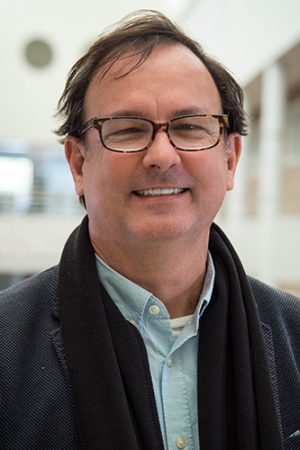Chris Jarrett

Chris Jarrett
Chris Jarrett is Professor of Architecture, Director of the Japan Summer Program, Co-Director of the designLAB, and President Emeritus of the Architectural Research Centers Consortium (ARCC). From 2009-2019, he served as Director of the School of Architecture. He holds a Master of Science in Architecture from Columbia University and a Bachelor of Architecture from the University of Oregon. His research focuses on the mutually constructed relationship between environment and culture. He is author of numerous papers and presentations, including Interstitial Interactions: Micro-Urban Strategies for Affordable and Resilient Place-Making (2024), Speculation (as) Practice (2024), Visualization of Research (2023), Intricate Compatibility: Study of a Hillside Lot in Tokyo (2021), Alexander Houses x7: Steel Prefab in the Low Desert (2018), New Housing Ecologies: Compact Spatial Ordering Systems to Support Sustainability (2014), Incremental Initiatives: Global Programming x6 (2014), Sustainable Design Revisited: Building Sound Neighborhood Strategies (2011), PowerHouse (2009), Eco-Transit at Hulsey Yards (2005), and Social Practice: Design Education and Everyday Life (2000). His research and pedagogical collaborations have been presented in 29 countries. His work has been published in Architecture, Progressive Architecture, Detail (Germany), On Diseno (Spain), Laras (Indonesia), JA (Japan), the Discovery Channel, CBS News, CNN, and the Los Angeles Times. He is currently working on several publications: Critical Ecologies, designLAB:Works, Architecture, Culture and Environment, and Akihisa Hirata: Living with Nature.
Jarrett has received grants from the US Department of Energy, US Department of Education, and the Graham Foundation for Advanced Studies in the Fine Arts. He has secured extramural funding in excess of $1,000,000 in support of his collaborative research and multi-disciplinary design-build projects from The Southern Company, Green Habitats Foundation, Aloca, BP Solar, Beazer Homes, SunPower, Ingersoll Rand, Electrolux, and Home Depot. He has won several design awards from the AIA and ACSA, as well as First Place in the Shinkenchiku-Sha International Design Competition, sponsored by the Central Glass Company in Tokyo; Second Prize in the New York Affordable Housing Challenge; Merit Award from AIA North Carolina for Urban Housing: Design Ideas Competition; Second Place in the House for the Next Millennium Competition sponsored by the Contemporary Arts Center in Cincinnati; and a Young California Architect’s Award from the Architectural Foundation of San Francisco, among others. Jarrett has been part of two award-winning US Department of Energy Solar Decathlon teams and was U.S. Director of the International Architectural Educational Exchange (IAEE), a global cities initiative jointly funded by the US Department of Education and the European Union. He led the 2007 Solar Decathlon Project for Georgia Tech, which received the BP Solar Award for Innovation and an AIA/Atlanta COTE Award.
Jarrett was co-curator of Terrain Vague: Photography, Architecture, and the Post-Industrial Landscape, an exhibit of contemporary urban landscape photographers at the Heinz Architectural Center, Carnegie Museum of Art, and the Atlanta Contemporary Art Center. He has organized numerous symposia, panels, and events and served as Chair of The Visibility of Research (2013), a three-day, peer-reviewed national conference on architectural research. His teaching engages a range of polemical ideas in environmental theory and practice, including urban ecocriticism, environmental art, post-modern environmentalism, green tectonics, and new media + ecology. He is past recipient of the Outstanding Teacher Award in the College of Architecture at Georgia Tech. Jarrett currently teaches the Graduate Diploma Studio, an undergraduate liberal studies course in arts and society, an elective on Japanese Concepts of Space, and a summer study abroad program in Tokyo, which has included collaborations with SANAA and faculty and students from Fukuoka University and Meiji University. He has previously taught at the Georgia Institute of Technology, Ecole Nationale Supérieure d’Architecture de Paris La Villette, and the University of Southern California.
EXPLORE HIS RECENT WORK
Students toured precast concrete projects on field trip, then designed a Tokyo hotel. A group of architecture graduate students, led by Jarrett, had the opportunity to take the School of Architecture’s first post-pandemic field trip in June 2021. Their field trip to New York City represented a “pivot” back to the kinds of in-person educational opportunities that the pandemic prevented.
PRESSING MATTER – Competition Affordable Housing: The project proposal for an affordable housing complex in a former industrial zone seeks to shift from the heroic use of steel to a softer, smoother state. The designLAB team propose that pressure forming metal via stamping and tooling processes can advance steel as a more subtle and seamless alternative to tectonic techniques. Sheet materials offer sophisticated shaping opportunities, demand lower energy use, and provide lateral resistance due to their planar and stress-skinned capabilities.
RESIDENTS AT WORK (R.A.W.) – Competition: R.A.W. proposes a residential-industrial urban community that reinscribes the legacy of the Wilmore neighborhood in Charlotte, North Carolina. The designLAB team aims to provide flexible economics that permit families to lease backyard micro-units, creating a small-scale, affordable “alley urbanism.” It also allows business owners to lease live/work spaces as part of an inclusive “maker network” along Mint Street, transforming a former industrial corridor into an incubator zone for small business development.